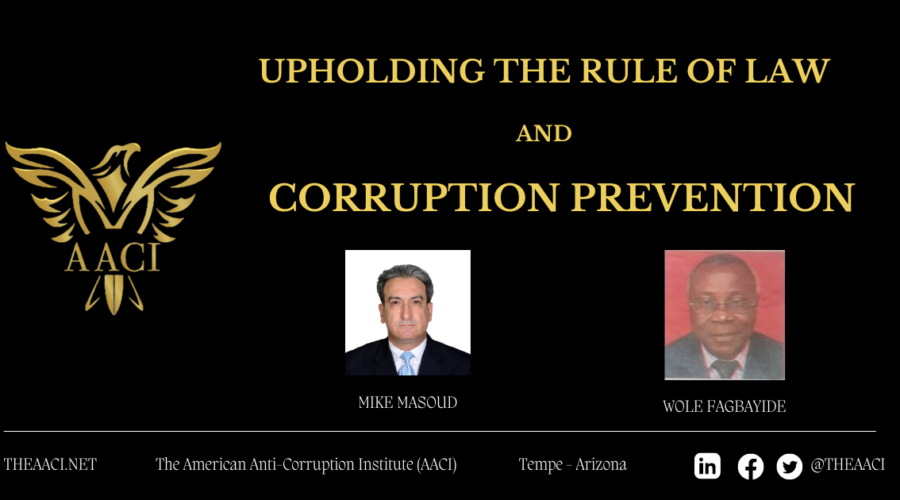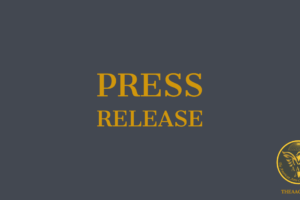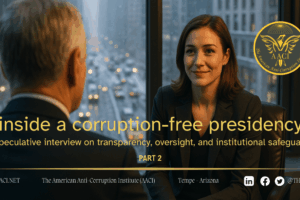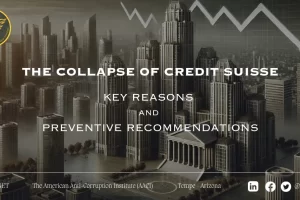March 30, 2024
Mike J. Masoud
Wole Fagbayide
Corruption is a global phenomenon that has its roots back in history and will always be present. While there is a consensus on the socioeconomic and political damages corruption causes, experts, and researchers, do not have a well-established agreement on what causes it. Albeit there is a distinct relationship between the rule of law and corruption.
Before we delve into this relationship, we presume that nations develop laws to achieve specific objectives. Those objectives should always be for the common good of the society and free from conflicts of interest. We also presume the design of the law considers the minorities’ needs and the welfare of citizens. Though we understand that there are not flawless laws, there is a vital difference between the design of laws and their enforcement. Putting statutes into action determines whether a country has or does not have the rule of law.
The rule of law is a primary determinant of whether a country is “developed” or “developing”. The popular foundation of the law is that people are not only equal before the law but it is also enforced. Upholding the rule of law shapes to a great extent the nations’ culture, values, and norms. It is no wonder the United Nations Convention Against Corruption emphasized the significant role of the judiciary branch of government in the fight against corruption. We believe that when public officials, private business leaders, and citizens do not uphold the rule of law, they put their country on the verge of failure. Each “failed” nation does not enforce the rule of law. Failed or semi-failed nations pose global economic and security threats to the international community. More than ever, the international community watches closely the efficacy of the judicial branch of government especially those of developing countries.
IMPACT OF THE RULE OF LAW
As The American Anti-Corruption Institute (AACI) emphasizes, the rule of law is a prerequisite for each of the following: good governance, internal control, and effective implementation of a national strategy to fight corruption, money laundering, and financing terrorism. There is a direct relationship between upholding the rule of law and the effective fight against corruption. Corruption prevention in all economic sectors suffers from the lack of upholding the rule of law. For example, when nepotism flourishes in an organization, its governance practices and internal control will not function properly and be effective as planned. The most dangerous result is the culmination of citizens’ distrust of public institutions and the country’s political leadership. That is why the countries ‘political leadership should always set the proper tone at the top, enhance and support the judiciary’s effectiveness, independence, and transparency, and protect it from any interference.
In line with these principles, The American Anti-Corruption Institute (AACI) promulgated the Ten Principles of Fighting Corruption, accompanied by its Standards on Fighting Corruption (SFCs), to form an internationally accepted framework to fight corruption effectively, efficiently, and intelligently. They help stakeholders to promote consistent practice and behavior and facilitate effective responses to identified corruption risks, assess and evaluate the entity’s commitment to fighting fraud and corruption, and support international efforts in lowering corruption risks to acceptable low levels. Prevalence of the rule of law is the first principle of fighting corruption.
CORRUPTION PREVENTION
Corruption prevention is always better than cure. Those charged with governance in all economic sectors should “invest” in preventing and deterring corruption. It is one of the essential investment decisions organizations make. Because corruption is a legal concept, it is illegal in most countries. Many studies have shown a positive correlation between corruption prevention and profitability. We urge organizations of all sizes that aspire for sustainable growth to embed in their culture and values the significance of upholding the rule of law as it prevents corruption. But boards and executive management should be aware of the simple reality: Corruption prevention effectiveness will never be better than those who set at the top. The organization’s culture mirrors the values and culture prevailing in the boardroom and executive.
THE TONE SET AT THE TOP IN NIGERIA
One cannot manage what he does not measure. Regrettably, there is no reliable, independent, and objective published information about the effectiveness of corruption prevention practices in both public and private sectors in Nigeria. Further, we do not believe in the measurement of the perception of corruption because it is not an objective measurement.
What is clear to us is the tone President Bola Ahamed Tinubu, sets at the top. We have many reasons to believe that Nigeria has a genuine political will to fight corruption, money laundering, and financing terrorism. However, it is not enough to have a political will to eradicate corruption, it needs the engagement of all stakeholders.
Authors
Professor Mike J. Masoud, CACM, CFE, MIPA AFA, MBA
Senior Director, the Middle East and Africa
The American Anti-Corruption Institute (AACI)
Mike@THEAACI.com
Tel: +1-480-409-4047
Signal: theaaci.01
Skype: mmasoudcpa
Dr. Wole Fagbayide, FCAA, CPA, FCTI, CNA, FCFM
North South Business School
316, Lagos Road, Maijudun Lagos, Nigeria.
Tel: 08033007267, 08023530998
Email: info@nsbsnig.org, nsbsnig2010@yahoo.com











































